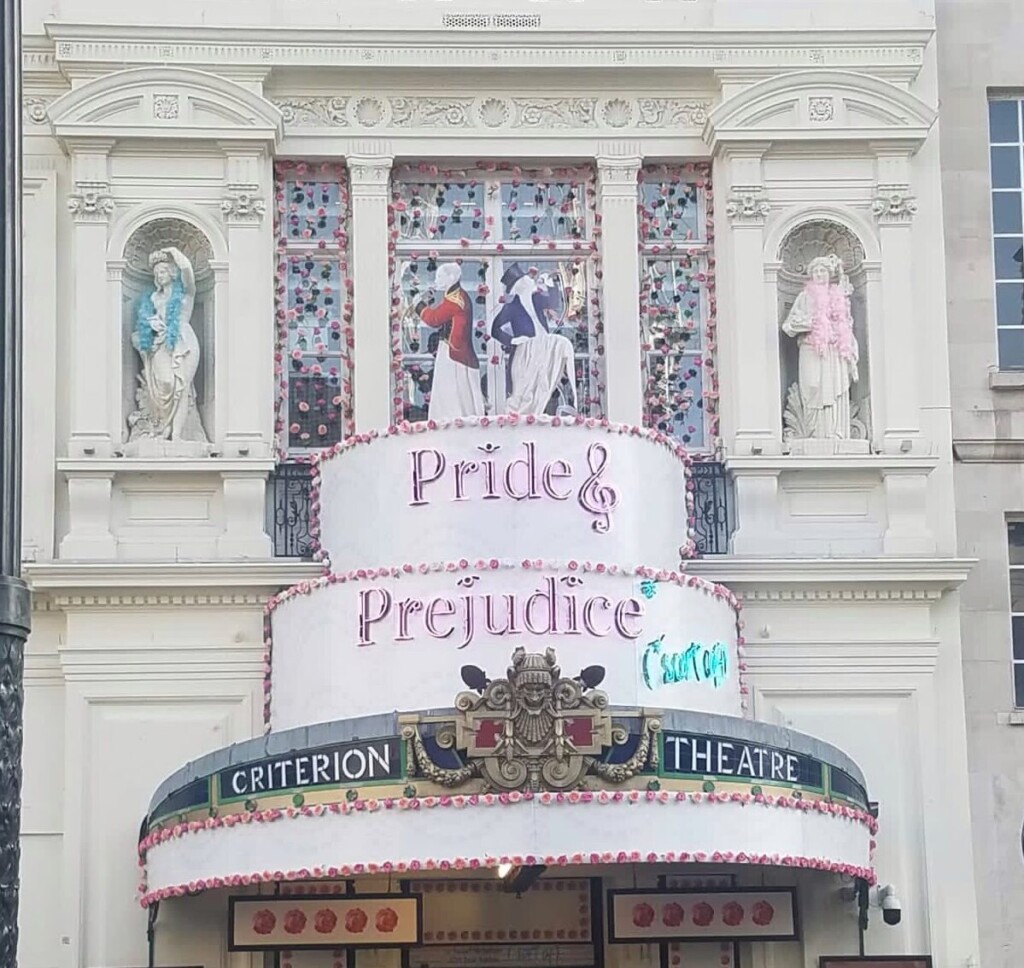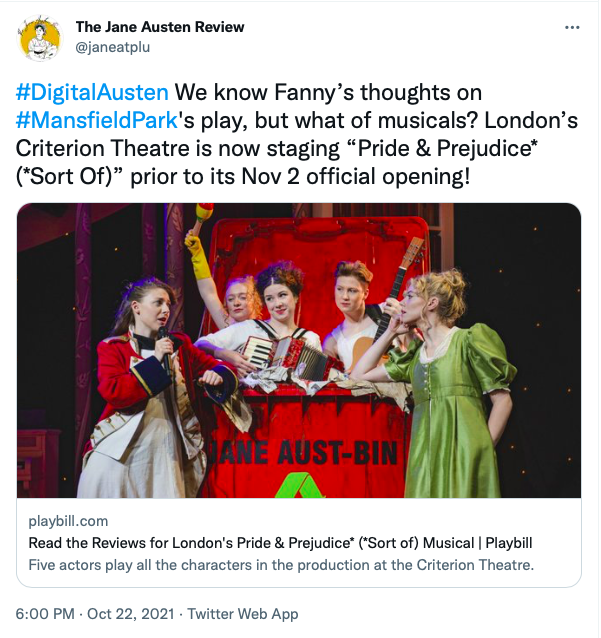Pride and Prejudice* (*sort of): A Review
By Madeline Scully

What would happen if Mr. Darcy’s letter to Elizabeth was not delivered? Pride and Prejudice* (*sort of), written and directed by Isobel McArthur, asks the audience to reflect on our unacknowledged erasure of servants as characters in novels, plays, and other cultural representations. Not quite a musical, this play nevertheless reimagines what an adaptation can do by turning to karaoke, with the actors grabbing microphones and singing modern songs to further the plot. The show originally opened in Glasgow in 2017 at the Tron Theatre, before gaining the support of eight regional producing theatres to produce a nationwide tour of the show. It officially moved to the West End on 15 October 2021, with a premiere set for 2 November 2021 at the Criterion Theatre.

After reading this #DigitalAusten tweet written by Elsa, I was inspired to see the show. I spent a delightful Sunday afternoon at the matinee performance. Here at the Jane Austen Review, we spend a lot of time reading and watching Austen adaptations and I wasn’t sure what to expect from Pride and Prejudice* (*sort of)—I was blown away by the performances I saw! I laughed so much and had an absolutely fantastic time. If you are in London or have the ability to travel to London, Pride and Prejudice* (*sort of) should unquestionably be added to your itinerary.
The show opens with the cast coming onstage dressed as servants and encouraging the audience to keep speaking, telling us that “we’re not starting yet.” This conversational approach to the beginning of the show made it a bit difficult to tell when things actually got started (besides the dimming of the lights). But it is an effective way of aligning the audience with the actors when they are portraying the servants, who are rarely seen, and are always anonymous vs named characters. The show is exposing our own assumptions as an audience about who matters in a play or novel by more explicitly naming the difference: servants vs the characters at the center of the plot or story. Placing the audience in the unfamiliar position of having to listen for the beginning of the play, created feelings of discomfort in the audience. I felt unsettled and unsure of what the actors expected of us. In this way, the play effectively subverts the hierarchies implicit in representations of class, digs into class disparities, and questions how the plot of romance novels would function without the servants working behind the scenes. As one character provocatively asks, “What would happen if we delivered a letter just a little bit later?” As any fan of Pride and Prejudice (1813) knows, this would have huge ramifications on the plot.
Each actor portrays a certain Austen character, with some doubling up, which results in certain characters never being onstage at the same time. For example, we never see Mr. Bingley and Caroline Bingley or Mr. Darcy and Mrs. Bennet together. All actors are dressed in white shift-dresses and throughout the play they add a different dress or coat over the shift-dress to symbolize which Austen character they are portraying. As an audience it is easy to get swept up in the way these characters are embodied by the actors, but throughout the play they break the fourth wall to remind us that they are portraying servants to showcase their importance to the plot.
One of the most compelling aspects of Pride and Prejudice* (*sort of) is its use of music to build on this critique of hierarchies. Writer Isobel McArthur uses karaoke to “involve as well as entertain the audience; seeing this show is like a speed read” (Playbill) Giving the actors a unique way to provide a voice to the traditionally voiceless servants, McArthur describes the karaoke style as an ode to the karaoke bars of Glasgow (https://www.youtube.com/watch?v=4DHOFpyrfqs&t=8s.).
Songs included in the show are: “Everyday I Write the Book” by Elvis Costello, “Young Hearts Run Free” by David Crawford and originally performed by Candi Stanton, “Will You Love Me Tomorrow” by Gerry Goffin and Carole King, “I Got You Babe” written by Sonny Bono and performed by Sonny & Cher, “Holding Out for A Hero” written by Jim Steinman and Dean Pitchford and performed by Bonnie Tyler, and “You’re So Vain” by Carly Simon. For anyone who was raised on this music and the Pride and Prejudice films, there is something special about watching the character of Lizzie Bennet karaoke “You’re So Vain” to Mr. Darcy.
While Pride and Prejudice* (*sort of) would be enjoyable for any audience member, as a committed fan of Jane Austen’s work, I found it incredibly funny and immensely enjoyable. It made me rethink my relationship to the world of Austen engagements and how a character is embodied and represented. So much of our attention is paid to named characters and it was really thought-provoking to spend two and a half hours considering what it means to be an insider in Austen’s world. I will definitely be reading the novels with a different lens from now on.
Although audiences do not need any familiarity with Pride and Prejudice to enjoy the show, I can only imagine that the deeper your background knowledge, the greater the enjoyment. The attention to detail in every aspect of the production is incredible. In one scene, the characters lean against a recycling bin that is labelled as taking (among other things) “the novels of Sir Walter Scott.” While Sir Walter Scott was a fan of Jane Austen’s work, she was not a fan of his and that highly specific joke had me laughing for far longer than was necessary. I thoroughly enjoyed every moment of the play and would happily go back at any time to watch it again.
Works Cited:
@janeatplu. “#DigitalAusten We know Fanny’s thoughts on #MansfieldPark‘s play, but what of musicals? London’s Criterion Theatre is now staging “Pride & Prejudice* (*Sort Of)” prior to its Nov 2 official opening!” Twitter, 22 October 2021, 6:00 pm, https://twitter.com/janeatplu/status/1451594199309029376.
Pride and Prejudice* (*sort of). , Moss Enterprises, 2021, https://prideandprejudicesortof.com., Accessed 7 November 2021.
“Pride and Prejudice* (*sort of) in the West End.” YouTube, uploaded by What’s Onstage, 28 October 2021, https://www.youtube.com/watch?v=4DHOFpyrfqs&t=8s.



Social Media